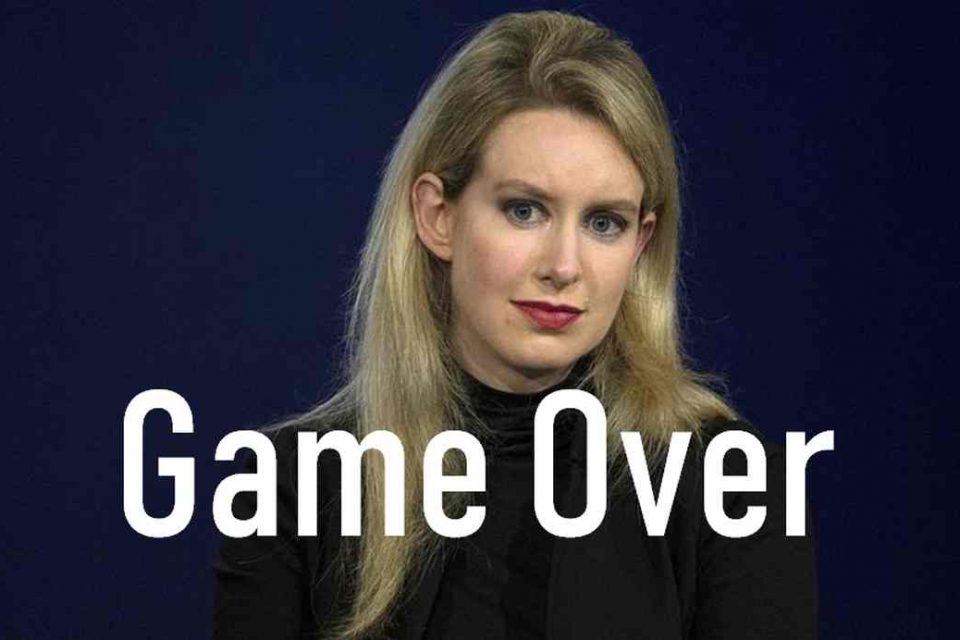Elizabeth Holmes, the founder of blood-testing startup Theranos, found guilty on multiple charges of criminal fraud

Elizabeth Holmes, the founder of blood-testing startup Theranos and one-time billionaire and the darling of Silicon Valley, has been found guilty of four charges in her criminal fraud trial. The jury of eight men and four women found Elizabeth Holmes handed down the guilty verdict after three months of proceedings and testimony from 32 witnesses.
U.S. District Court Judge Edward Davila will sentence Holmes at a later date. Holmes could serve up to 20 years in prison. Holmes was found not guilty on four charges and there was no verdict on the other three. Jurors told Davila earlier on Monday that they were deadlocked on three of the 11 charges.
Assistant U.S. Attorney Jeffrey Schenk told the jury that Holmes “chose fraud over business failure. She chose to be dishonest with her investors and patients. That choice was not only callous, it was criminal.” Schenk added:
“You do not need to decide whether that abuse happened to reach your verdict. The case is about false statements made to investors, false statements made to patients.”
We’ve been covering Theranos since August 2018 when the company shut down after losing nearly $1 billion in investors’ money. Holmes founded Theranos in 2003 after dropping out of Stanford University. The startup promised a revolutionary system that runs hundreds of medical tests using a single drop of blood. However, Holmes’s biotech company never lived up to expectations.
She was later sued for defrauding investors and patients out of more than $700 million. Theranos is now synonymous with fraud in the tech circle and arguably the largest biomedical fraud in U.S. history. Some people even compared Holmes to Bernie Madoff, the once-revered New York financier who pled guilty to stealing billions of dollars through an illegal Ponzi scheme before he later died in prison.
In August 2021, Holmes, along with former Theranos Chief Operating Officer Ramesh “Sunny” Balwani, were on trial for defrauding investors and patients through her biotech startup Theranos.
The story of Holmes started in 2003 at the age of 19 after she dropped out of Stanford University to start Theranos. She later used her parents’ education trust to found the company that would later be called Theranos. The company was previously named “Real-Time Cures.” She later changed after deciding that too many people were dubious about the word “cure.” At its peak, Theranos was valued at $10 billion and made Holmes a Silicon Valley star at the age of 19.
Just like a house of cards, it all came crashing down in October 2015 after a damning investigation by the Wall Street Journal called into question the capabilities of Theranos’s proprietary blood-testing machine, Edison, and Theranos’ testing methods.
Fast forward three years later, The Department of Justice (DOJ) announced that Holmes was indicted by a federal grand jury in California on charges of wire fraud. According to the indictment, Holmes and Balwani encouraged doctors and patients to use the company’s blood-testing services even though the defendants knew Theranos was not capable of consistently producing accurate and reliable results for certain blood tests. You can read our coverage of the fraud charges here.
Then on March 15, 2020, The Securities and Exchange Commission (SEC) accused Theranos and former Theranos President Ramesh “Sunny” Balwani of defrauding investors of more than $700 million through false claims about its technology. In a separate report, the SEC also said Elizabeth Holmes exaggerated the company’s revenue by 1,000 times to investors, says SEC.
Holmes and Balwani pleaded not guilty to charges they defrauded investors, doctors, and patients by falsely claiming Theranos could revolutionize medical lab testing with technology that could enable a wide array of tests with a few drops of blood.
More than two years after the SEC announcement, Elizabeth Holmes appeared before the US District Court judge in San Diego. According to her lawyers, the disgraced Theranos founder Elizabeth Holmes plans to blame ‘mental illness’ in her trial defense when she defrauded investors out of more than $700 million with her fake blood-testing technology in 2018. Holmes’ mental state had been previously discussed in sealed court documents and a closed July 8 hearing.
Holmes’ trial was delayed last year after she told the court she was pregnant. On August 5, Elizabeth Holmes gave birth to a baby boy. No one knows who the father of the baby is. Holmes still faces a dozen felony counts of wire fraud and other criminal charges. She and the former Theranos COO Ramesh Balwani now face up to 20 years in prison if convicted.




